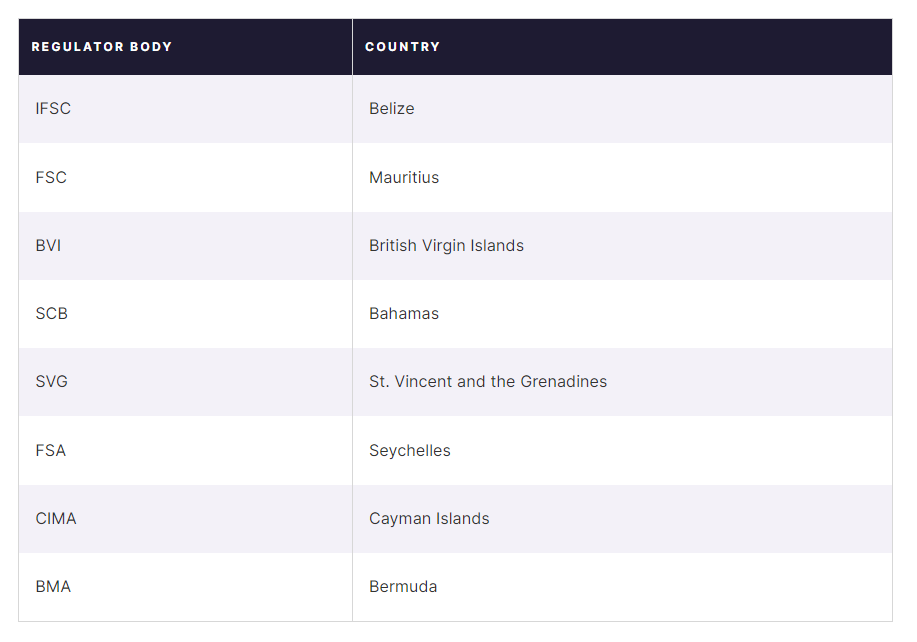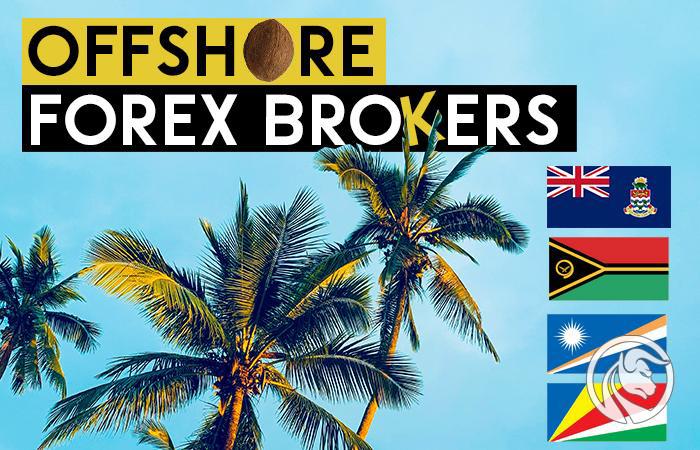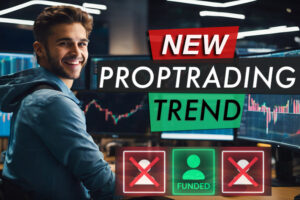Offshore broker – how much does the license cost? Advantages and disadvantages of exotic adjustments
An offshore broker is a choice that offers both benefits and potential risks. Na Forex market there are brokers who are registered in various countries. There are domestic companies present, such as: XTB. There are also foreign brokers such as: Tickmill or Dukascopy originating from EU countries. There are also offshore brokers who are registered with “exotic” destinations. Most often, this type of companies operate in countries with a relatively lenient regulatory approach. For years, Cyprus has been a popular place to operate as a broker in Europe. Of course, not only Cyprus is famous for its relatively quick and cheap path to granting a license (although after... IronFX scandal in 2015, this road became longer and more complicated). A popular route to obtaining offshore licenses are British Virgin Islands (BVI), Marshall Islands, Bahamas, Belize, Seychelles, Cayman Islands, Vanuatu or Mauritius. And we will focus on them in this article.
Why do brokers prefer to register in such countries and not, for example, Great Britain, Poland or Germany? Offshore regulators are able to create an easy climate for setting up and running this type of business. There are also a number of additional factors. The most important of them include:
- lower taxes,
- less restrictive financial regulations,
- lower license cost,
- lower capital requirements.
- greater freedom in creating the offer (financial leverage, promotions, bonuses).
What most often resonates is the fact that an offshore broker can, for example, offer a greater scope of access to assets and higher financial leverage, which cannot be done by brokers registered e.g. in the USA or Europe (due to applicable regulations). ESMA regulations). There are more differences, but one by one.
Why were offshore brokers created?
There's no point in cheating - “heaven” for establishing brokerage companies were not created so that the client would have greater protection of rights or trading security. Some countries have specialized in offering broker licenses, which can be arranged very quickly. Moreover, such countries allow you to set up a company at low cost, without having to spend a fortune on administrative and legal activities. In addition, offshore regulators are very liberal in their approach to requirements related to capital adequacy and control of financial activities.
Defenders of offshore brokers mention: overshoot most important capital markets. In their opinion, customer protection has gone too far. For example, in the United States it is possible trading on CFDs is severely limited. In turn, investors from Europe can use this type of financial instruments. In turn, in the European Union, the maximum financial leverage has been limited. ESMA has set maximum leverage levels on selected financial instruments. In turn, in some countries there are no restrictions on the use of leverage.
For some brokers, legal issues are a big plus. Often the law in offshore countries is more stringent “pro-company” than “pro-customer”. Importantly, the injured client would have to claim his rights in the broker's country of operation. The legal costs associated with asserting your rights are often too high. The client loses a small deposit and is unable to effectively enforce his rights. Therefore, dishonest entrepreneurs mainly choose destinations with little supervision.
Does this mean that every offshore broker is a scammer? - No.
Should you be especially careful before signing a contract and transferring funds to an offshore broker? - Of course.
It is therefore worth looking for an offshore broker that voluntarily implements some of the regulations and good practices introduced by the most important forex market regulators in the world. These include ESMA (European Union), ASIC (Australia), CFTC i SEC (USA) or IIROC (Canada). This makes it more certain that the broker chose the offshore option to reduce bureaucracy and not, for example, to deceive the client.
Requirements based on the example of the Cayman Islands
The Cayman Islands is one of the favorite places to set up offshore companies. It is one of the tax havens. Interestingly, some Chinese companies, in order to obtain capital from foreign investors, created structures in the Cayman Islands. An example would be Tencent, which is one of the largest technology companies in the world.
The Cayman Islands is also a place where companies were created to avoid paying taxes in Europe or other countries. Favorable tax policy has resulted in more companies being registered on the islands than residents. In 2020, the European Union removed the Cayman Islands from its list of tax havens. For some politicians and commentators it was a highly controversial decision.
How much does a forex broker license cost?
Continuing with the example of the Cayman Islands - setting up a company operating as forex broker requires the establishment of the so-called CIC, or Cayman Islands Company. Only this type of company can provide brokerage services on the Forex market. The next step is to obtain approval from CIMA, the Cayman Islands financial markets regulator. The full name of this institution is Cayman Islands Monetary Authority. Of course, the company must also comply with the regulations contained in The Securities Investment Business Act (SIBA). The mentioned legal act defines the framework of activities and requirements, e.g. regarding anti-money laundering (AML).
Of course, the securities submitted by the company must meet the criteria specified by regulators. For CIMA, a company must include one with its application information like:
- business plan,
- internal and external company policy,
- information about the company's beneficiaries (shareholders),
- employment contracts of all senior managers,
- implementation of the AML/CFT program.
In addition, the company must have at least two senior managers who have appropriate experience in the financial sector and have appropriate education. Another condition is that managers must have a certificate confirming that they have no criminal record (certificate of good conduct). CIMA's decision usually takes up to 90 days. After obtaining consent, the company can provide its services. This means that it can accept deposits, offer access to financial instruments and develop its operational activities.
It is worth noting that according to Cayman Island Tax Concession Law For two decades, the company has been sure what tax rates will apply to it. Some companies have the right not to pay tax on profits. It is also worth taking a look at the costs that must be incurred to set up a brokerage company in the Cayman Islands. The license application itself costs approximately 500 Caymanian dollars, or approximately USD 600. Converted into PLN, the cost is approximately PLN 2600 (at the current exchange rate). The annual fee for continuing to operate as a company is 8 Caymanian dollars, or approximately USD 000 (over PLN 9300).
Other offshore regulators
There are more favorable locations for establishing brokerage companies. The most important of them include places such as: Belize, Mauritius, Virgin Islands, Bahamas, Seychelles or Bermudy.

Popular offshore licenses. Source: investingoal.com
Worth paying attention to Bermudy, because it is also one of the more popular destinations for offshore brokers. For many years, Bermuda was considered one of the offshore centers in the world. It was also one of the “favorites” places to create structures that optimize taxes. No wonder some forex brokers are also interested in this country. In Bermuda, the chief overseer is Bermuda Monetary Authority (BMA). Bermuda brokers include: known for offering non-professional clients the opportunity to benefit from leverage of 1:500 (and sometimes even more). Obtaining a license takes approximately 3-4 months and requires a level of capital outlay approximately $100.
Of course, there are other regions that offer a quick and cheap path to starting a forex broker business. Vanuatu is such a place. It is an island in the Pacific that lies north-east of Australia. Vanuatu is another tax haven and place of registration for offshore brokers. The market is regulated by VFSC, i.e Vanuatu Financial Services Commission. One of the biggest advantages of this place is the speed of starting a company. You can start a business quickly - You must wait 3 to 4 months for the license to be granted. The whole process costs money approximately $30, while the minimum deposit on a business account is $42.
In Maurtitius, a broker must have a minimum of $21 in capital. In the case of a broker registered in Seychelles, the broker's liquid capital should be a minimum of $800. It must be admitted that as per "a serious financial company" it's a relatively small investment. And this tempts potential entrepreneurs of small size.
Advantages and disadvantages of offshore brokers
Using the offers of offshore brokers has its advantages and disadvantages, which are worth being aware of.
Advantages of using the offshore offer:
- access to high financial leverage,
- a wide range of financial instruments,
- bonuses, promotions and other incentives,
- protection of customer privacy,
- smaller adjustment corset.
Disadvantages of using an offshore offer:
- usually no protection against negative balance,
- lack of such extensive protection of customer rights as in the European Union or the United States,
- the need to assert your rights in the country where the broker is registered,
- greater risk of dealing with a dishonest broker,
- practically zero chance of help from the regulator in the event of a conflict on the line client – broker.
As you can see, an investor who decides to use an offshore broker must be aware of potential legal problems. In case of problems with the payment of funds, the European investor is not protected by European Union law. This situation creates an opportunity for dishonest brokers to set up their business. Of course, not every offshore broker is dishonest. However, the investor must carefully examine the broker, look for opinions and check whether any proceedings are pending against the company.
Purchasing a license
It happens that broker licenses are purchased. The reason is the desire to shorten the time needed to start a business. For some regulators, the licensing process takes up to a year. If the broker decides to buy the license, he will pay more, but the process itself will be completed within 3-4 months.
What are the license purchase prices? According to Finance Magnates, license prices can be really high. For example, the cost of acquiring a license in the UK for an STP broker is approximately £1 million. In the case of a market maker's activity, the license cost is even higher. For an ASIC regulated broker license, prices start from €2 million. Of course, in less restrictive countries the cost of licensing is lower. In case of CySEC license the license is worth between €400 and €600. €. In the case of Mauritius, the cost is even lower and ranges from €250 to €350.
After looking at the prices, you can immediately see how favorable conditions offshore countries have created for new forex businesses.
Regulators from other countries vs. offshore
An investor should be aware that when using offshore brokers, they may have less protection than with brokers regulated by supervisors from the European Union, Great Britain or the United States.
Often, regulators in offshore markets are not as strict as some European, Asian or American regulators. The investor protection mechanism in offshore countries is also lower. For example, negative margin protection is not required in the Cayman Islands. An offshore broker may offer this to his clients, but is not legally obliged to do so.
Respected European regulators include German BaFin or British FCA. Of course, this does not mean that obtaining a license from these institutions is a guarantee that the broker will behave honestly. Every time before depositing funds you must “x-ray” broker. However, let's take a look at what the mentioned regulators from Europe offer.
FCA is one of the most renowned regulatory bodies in the world. It is distinguished by rigorous rules and the inevitability of their enforcement. Brokers who are subject to the rules of the British office are obliged to comply with a number of rules. These include, among others:
- having a minimum amount of capital,
- separating client funds from the broker's capital,
- joining the Financial Services Compensation Scheme (FSCS), which gives clients the opportunity to receive compensation in the event of the broker's bankruptcy.
BaFin is the main German regulatory authority. This office also requires compliance with certain rules. These include:
- brokers' consent to audit by BaFin,
- customer deposit protection system,
- separation of funds from the broker's capital.
Is it legal to use the services of an offshore broker?
The law does not prohibit anyone from choosing an offshore broker. However, you must be aware that we do it at our own risk. Choosing an offshore broker can be a beneficial decision for an investor for the previously mentioned reasons. However, it also carries a number of risks, so before depositing funds, it is worth carefully analyzing all the arguments for and against. It is standard to take steps to minimize the risk of choosing the wrong broker.
It is worth answering the following questions:
- Will my funds be safe? (e.g. is there a deposit guarantee scheme)
- Does the broker have good opinions among customers? (and are these opinions reliable)
- Have there been situations where the broker behaved unethically?
- Are there any criminal proceedings against the broker?
- Has the broker been punished for irregularities? If so, what?
- What are the trading conditions? (e.g. fees, commissions, swaps, contractual penalties)
As you can see, questions about the commercial offer are in last place. The most important thing is the safety of your funds. After all, why do we need great trading conditions if we have problems with withdrawals? If, after the analysis, you select honest offshore brokers, only then look at the offer of instruments, leverage and transaction costs.
One broker, several licenses
A popular phenomenon is that brokers are regulated in several different countries, e.g. IC Markets is licensed in Australia, Cyprus and the Seychelles. Tickmill is regulated by the British FCA, the Cypriot CySEC and the Seychelles FSA. Some companies have a really wide portfolio (5 licenses or more). Why so much trouble? The license is primarily about trust built among customers, but also about the opportunities that open up to the company on a given market (e.g. the possibility of advertising, participating in expo, etc.). Therefore, large companies, which primarily have adequate financial resources and ambitions to become famous on specific global markets, often create additional companies registered in different parts of the world.
Summation
The activities of offshore brokers are not illegal. However, it is worth thoroughly examining the broker and checking how the client's funds are protected. We also cannot forget about customer opinions and resolving disputes with the broker. If it turns out that the client will have to sue in Vanuatu if he files a claim, the skin may not be worth the purchase (this applies primarily to small brokers for whom the client's opinion and satisfaction will be of little importance). Some offshore brokers themselves offer better customer protection conditions than the offshore regulator itself requires. Therefore, you should not consider an offshore broker as a scam. However, you should approach the offer of this type of brokers with great caution, especially if, for example, the Cayman Islands is their only place of registration, they do not have many opinions on the Internet or they do not form part of a large capital group.






















![Forex Club – Tax 9 – Settle tax on a foreign broker [Download the Application] Forex Club - Tax 9](https://forexclub.pl/wp-content/uploads/2024/02/Forex-Club-Podatek-9-184x120.jpg?v=1709046278)
![Trading View platform – solutions tailored to the needs of traders [Review] trading view review](https://forexclub.pl/wp-content/uploads/2024/03/trading-view-recenzja-184x120.jpg?v=1709558918)
![How to connect your FP Markets account to the Trading View platform [Guide] fp markets trading view](https://forexclub.pl/wp-content/uploads/2024/02/fp-markets-trading-view-184x120.jpg?v=1708677291)
![How to invest in ChatGPT and AI? Stocks and ETFs [Guide] how to invest in chatgpt and artificial intelligence](https://forexclub.pl/wp-content/uploads/2023/02/jak-inwestowac-w-chatgpt-i-sztuczna-inteligencje-184x120.jpg?v=1676364263)




![Izabela Górecka – “Success on the market depends not only on knowledge, but also on emotional stability” [Interview] Izabela Górecka - interview](https://forexclub.pl/wp-content/uploads/2024/04/Izabela-Gorecka-wywiad-184x120.jpg?v=1713870578)
![WeWork – the anatomy of the collapse of a company valued at $47 billion [WeWork, part II] wework bankruptcy story](https://forexclub.pl/wp-content/uploads/2024/04/wework-bankructwo-historia-184x120.jpg?v=1711729561)
![Adam Neumann – the man who screwed up Softbank [WeWork, part AND] adam neumann wework](https://forexclub.pl/wp-content/uploads/2024/04/adam-neumann-wework-184x120.jpg?v=1711728724)




![The most common mistakes of a beginner trader - Mr Yogi [VIDEO] Scalping - The most common mistakes of a beginner trader - VIDEO](https://forexclub.pl/wp-content/uploads/2024/03/Scalping-Najczestsze-bledy-poczatkujacego-tradera-VIDEO-184x120.jpg?v=1711601376)
![Learning patience: No position is also a position - Mr Yogi [VIDEO] Scalping - Learning patience - No position is also a position - VIDEO](https://forexclub.pl/wp-content/uploads/2024/03/Scalping-Nauka-cierpliwosci-Brak-pozycji-to-tez-pozycja-VIDEO-184x120.jpg?v=1710999249)
![When to exit a position and how to minimize losses - Mr Yogi [VIDEO] Scalping - When to exit a position and how to minimize losses - VIDEO](https://forexclub.pl/wp-content/uploads/2024/03/Scalping-Kiedy-wyjsc-z-pozycji-i-jak-minimalizowac-straty-VIDEO-184x120.jpg?v=1710336731)




![How to connect your FP Markets account to the Trading View platform [Guide] fp markets trading view](https://forexclub.pl/wp-content/uploads/2024/02/fp-markets-trading-view-300x200.jpg?v=1708677291)














Leave a Response